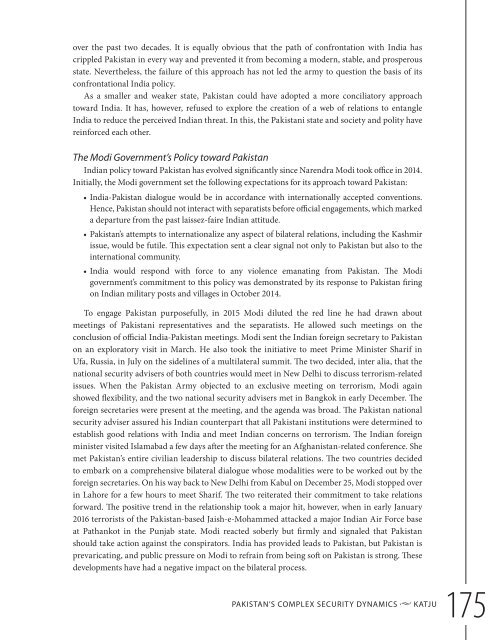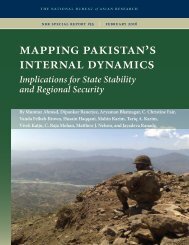pakistan’s
SR55_Mapping_Pakistan_February2016
SR55_Mapping_Pakistan_February2016
Create successful ePaper yourself
Turn your PDF publications into a flip-book with our unique Google optimized e-Paper software.
over the past two decades. It is equally obvious that the path of confrontation with India has<br />
crippled Pakistan in every way and prevented it from becoming a modern, stable, and prosperous<br />
state. Nevertheless, the failure of this approach has not led the army to question the basis of its<br />
confrontational India policy.<br />
As a smaller and weaker state, Pakistan could have adopted a more conciliatory approach<br />
toward India. It has, however, refused to explore the creation of a web of relations to entangle<br />
India to reduce the perceived Indian threat. In this, the Pakistani state and society and polity have<br />
reinforced each other.<br />
The Modi Government’s Policy toward Pakistan<br />
Indian policy toward Pakistan has evolved significantly since Narendra Modi took office in 2014.<br />
Initially, the Modi government set the following expectations for its approach toward Pakistan:<br />
• India-Pakistan dialogue would be in accordance with internationally accepted conventions.<br />
Hence, Pakistan should not interact with separatists before official engagements, which marked<br />
a departure from the past laissez-faire Indian attitude.<br />
• Pakistan’s attempts to internationalize any aspect of bilateral relations, including the Kashmir<br />
issue, would be futile. This expectation sent a clear signal not only to Pakistan but also to the<br />
international community.<br />
• India would respond with force to any violence emanating from Pakistan. The Modi<br />
government’s commitment to this policy was demonstrated by its response to Pakistan firing<br />
on Indian military posts and villages in October 2014.<br />
To engage Pakistan purposefully, in 2015 Modi diluted the red line he had drawn about<br />
meetings of Pakistani representatives and the separatists. He allowed such meetings on the<br />
conclusion of official India-Pakistan meetings. Modi sent the Indian foreign secretary to Pakistan<br />
on an exploratory visit in March. He also took the initiative to meet Prime Minister Sharif in<br />
Ufa, Russia, in July on the sidelines of a multilateral summit. The two decided, inter alia, that the<br />
national security advisers of both countries would meet in New Delhi to discuss terrorism-related<br />
issues. When the Pakistan Army objected to an exclusive meeting on terrorism, Modi again<br />
showed flexibility, and the two national security advisers met in Bangkok in early December. The<br />
foreign secretaries were present at the meeting, and the agenda was broad. The Pakistan national<br />
security adviser assured his Indian counterpart that all Pakistani institutions were determined to<br />
establish good relations with India and meet Indian concerns on terrorism. The Indian foreign<br />
minister visited Islamabad a few days ater the meeting for an Afghanistan-related conference. She<br />
met Pakistan’s entire civilian leadership to discuss bilateral relations. The two countries decided<br />
to embark on a comprehensive bilateral dialogue whose modalities were to be worked out by the<br />
foreign secretaries. On his way back to New Delhi from Kabul on December 25, Modi stopped over<br />
in Lahore for a few hours to meet Sharif. The two reiterated their commitment to take relations<br />
forward. The positive trend in the relationship took a major hit, however, when in early January<br />
2016 terrorists of the Pakistan-based Jaish-e-Mohammed attacked a major Indian Air Force base<br />
at Pathankot in the Punjab state. Modi reacted soberly but firmly and signaled that Pakistan<br />
should take action against the conspirators. India has provided leads to Pakistan, but Pakistan is<br />
prevaricating, and public pressure on Modi to refrain from being sot on Pakistan is strong. These<br />
developments have had a negative impact on the bilateral process.<br />
PAKISTAN’S COMPLEX SECURITY DYNAMICS u KATJU<br />
175



